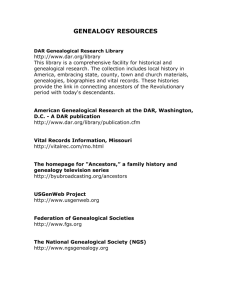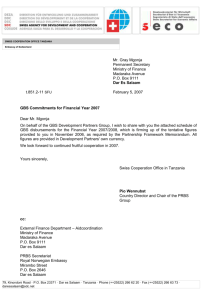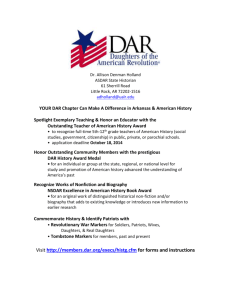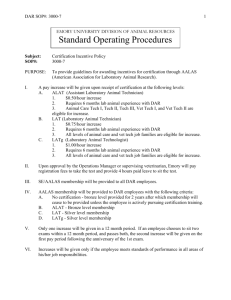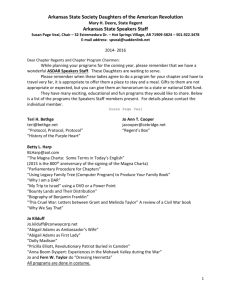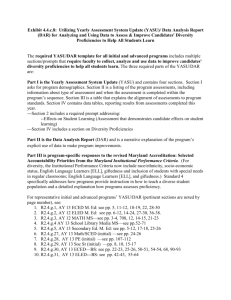DAR Facts: Daughters of the American Revolution Overview
advertisement
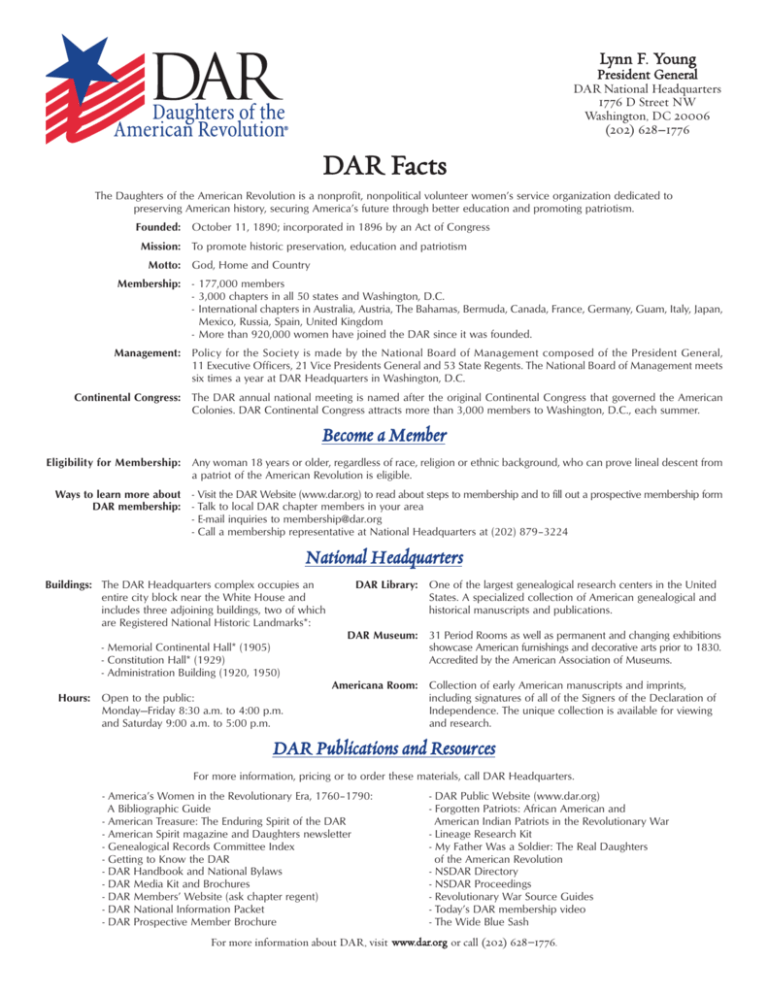
★ Lynn F. Young President General DAR National Headquarters 1776 D Street NW Washington, DC 20006 (202) 628–1776 DAR Facts The Daughters of the American Revolution is a nonprofit, nonpolitical volunteer women’s service organization dedicated to preserving American history, securing America’s future through better education and promoting patriotism. Founded: Mission: Motto: October 11, 1890; incorporated in 1896 by an Act of Congress To promote historic preservation, education and patriotism God, Home and Country Membership: - 177,000 members - 3,000 chapters in all 50 states and Washington, D.C. - International chapters in Australia, Austria, The Bahamas, Bermuda, Canada, France, Germany, Guam, Italy, Japan, Mexico, Russia, Spain, United Kingdom - More than 920,000 women have joined the DAR since it was founded. Management: Policy for the Society is made by the National Board of Management composed of the President General, 11 Executive Officers, 21 Vice Presidents General and 53 State Regents. The National Board of Management meets six times a year at DAR Headquarters in Washington, D.C. Continental Congress: The DAR annual national meeting is named after the original Continental Congress that governed the American Colonies. DAR Continental Congress attracts more than 3,000 members to Washington, D.C., each summer. Become a Member Eligibility for Membership: Any woman 18 years or older, regardless of race, religion or ethnic background, who can prove lineal descent from a patriot of the American Revolution is eligible. Ways to learn more about DAR membership: - Visit the DAR Website (www.dar.org) to read about steps to membership and to fill out a prospective membership form - Talk to local DAR chapter members in your area - E-mail inquiries to membership@dar.org - Call a membership representative at National Headquarters at (202) 879–3224 National Headquarters Buildings: The DAR Headquarters complex occupies an entire city block near the White House and includes three adjoining buildings, two of which are Registered National Historic Landmarks*: DAR Library: DAR Museum: - Memorial Continental Hall* (1905) - Constitution Hall* (1929) - Administration Building (1920, 1950) Americana Room: Hours: Open to the public: Monday—Friday 8:30 a.m. to 4:00 p.m. and Saturday 9:00 a.m. to 5:00 p.m. One of the largest genealogical research centers in the United States. A specialized collection of American genealogical and historical manuscripts and publications. 31 Period Rooms as well as permanent and changing exhibitions showcase American furnishings and decorative arts prior to 1830. Accredited by the American Association of Museums. Collection of early American manuscripts and imprints, including signatures of all of the Signers of the Declaration of Independence. The unique collection is available for viewing and research. DAR Publications and Resources For more information, pricing or to order these materials, call DAR Headquarters. - America’s Women in the Revolutionary Era, 1760–1790: A Bibliographic Guide - American Treasure: The Enduring Spirit of the DAR - American Spirit magazine and Daughters newsletter - Genealogical Records Committee Index - Getting to Know the DAR - DAR Handbook and National Bylaws - DAR Media Kit and Brochures - DAR Members’ Website (ask chapter regent) - DAR National Information Packet - DAR Prospective Member Brochure - DAR Public Website (www.dar.org) - Forgotten Patriots: African American and American Indian Patriots in the Revolutionary War - Lineage Research Kit - My Father Was a Soldier: The Real Daughters of the American Revolution - NSDAR Directory - NSDAR Proceedings - Revolutionary War Source Guides - Today’s DAR membership video - The Wide Blue Sash For more information about DAR, visit www.dar.org or call (202) 628–1776. DAR Committees Most of the volunteer work of DAR is accomplished under a committee system comprised of national chairs appointed by the President General and locally appointed state and chapter chairs. The national chairs direct, supervise and promote the activities of their committees with the assistance of national vice chairs. DAR committees promoting the mission of the society include (but are not limited to): Historic Preservation American Heritage: Promotes the preservation of American cultural traditions, crafts and music. Genealogical Records: More than 18,000 volumes of unpublished source records have been copied and bound for the DAR Library. Historic Preservation: Oversees awarding of the Historic Preservation Medal and supervises the Historic Preservation Project Contest; documents historic site preservation and research. Lineage Research: Those knowledgeable in genealogy assist prospective members and hold workshops. President General’s Project: “Celebrate America!” is a project to restore and improve the NSDAR complex of historic buildings, to strengthen membership and to invest in our communities. DAR Library: Repository for electronic genealogical resources and microforms of state records not found in other local research centers. Education American History: Sponsors American History essay contests for students in fifth through eighth grades, including homeschooled children. American Indians: DAR has assisted American Indians with financial and scholarship aid since 1936. Children of the American Revolution: Founded in 1895 by the DAR, this committee provides patriotic and leadership training today’s youth. DAR Good Citizens: Promotes dependability, service, leadership and patriotism among high-school seniors by presenting national and state awards. DAR Scholarship: Thousands of dollars are awarded through NSDAR American history, political science, history, government, historic preservation, economics, music, nursing, medical and occupational therapy scholarships annually. DAR School: Support given to Kate Duncan Smith DAR School, AL; Tamassee DAR School, SC; Berry College, GA; Crossnore School, NC; Hillside School, MA; Hindman Settlement School, KY. Junior American Citizens: Citizenship training program for boys and girls, kindergarten through high school. JAC Clubs are available to parochial, private, public and homeschooled students. Literacy Promotion: Promotes adult literacy and involvement in literacy programs. Patriotism Celebrate America!: A challenge issued to all DAR members to invest a collective million hours of community service a year as a way to celebrate America by giving back to our communities. Community Service Awards: Medals given to recognize local citizens for outstanding achievements in cultural, educational, humanitarian, patriotic and citizenship work in their communities. Constitution Week: DAR sponsors special programs during the week of September 17–23 to raise awareness about the United States Constitution. This official weeklong celebration of the Constitution was initiated by the DAR in 1955 and adopted by the U.S. Congress in 1956. DAR Service for Veterans: As a member of the National Veterans Administration Voluntary Service Advisory Committee, DAR has representatives in Veterans Administration (VA) Medical Centers. DAR members volunteer in VA facilities and in state- and community-based programs, donating gifts, cash, personal care items, cancelled postage stamps and thousands of hours of time in service to America’s veterans. The Flag of the United States of America: National Defense: DAR Project Patriot: Thousands of flags, flag codes, certificates and other patriotic materials are distributed annually. Youth Citizenship Awards are presented to elementary through high-school students. Gold and bronze ROTC medals are presented to outstanding high-school and college cadets. Provides support to America’s service personnel in current conflicts abroad. Some Additional Committees - Americanism Commemorative Events Conservation Continental Congress - DAR Leadership Training DAR Magazine DAR Museum Outreach Membership - Special Projects Grants Units Overseas Volunteer Genealogists Women’s Issues For more information about DAR, visit www.dar.org or call (202) 628–1776 Document No. PG–2000 (Revised February 2014) (0214–001–PP)

